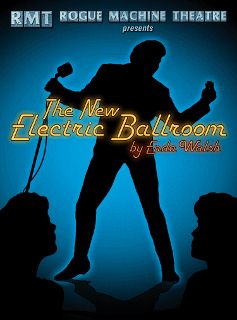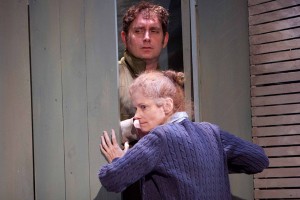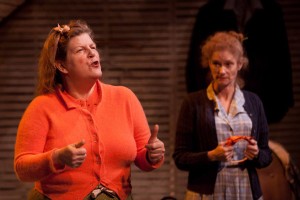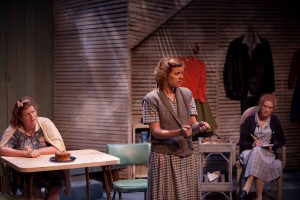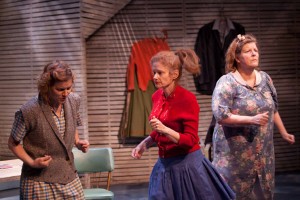THE GIFT OF SPEECH
There is no possibility of love or happiness in Enda Walsh’s play The New Electric Ballroom, produced by Rogue Machine, winner of 2010 and 2011 Ovation and L.A. Drama Critics Circle awards. Walsh won a Tony for the book of Once just days before this show opened, and he is widely (and justifiably) considered one of the best and brightest of playwrights.
The play begins and ends with a ferocious tirade, an avalanche of talk about the fact that people do, indeed, talk. The characters here are desperate to speak—sometimes to communicate feelings; sometimes to bury them. Three sisters live in an Irish fishing village, trapped in a reenacted loop of the botched romantic embarrassments that have come to define their lives. They perform them like a children’s recital, dutifully chanting the lines, adding costumes, makeup, dance moves, background vocals, and pig noises to boot.
Two of them replay the actual events, reciting them as sacred texts, picking endlessly at their wounds—there is no chance for a scab to form—while the third, the youngest, plays only a supporting role, for she has yet to directly experience the same humiliations.
That is, until now, when a fisherman of dubious intelligence finally crosses the threshold and enters their house—a place where visitors are not allowed. By the end of the evening, the youngest sister earns her stripes, and the other two welcome her fully into their sisterhood of misery. They will replay their shame forever now, with no glimmer of possibility that any of them can transcend or escape their agonies.
This is a very good play with some excellent performances. In the end, though, I’m not sure how I actually felt about it. I was transfixed rather than moved. The Rogue Machine has done well by Enda Walsh, and 2012 will likely bring them more accolades, but I wanted to love this much more than I did.
Nonetheless, this is a very funny script. The language is specific and well observed. “The Virgin Mary never did age,“ says Clara, the middle sister, “Of course, that may have had something to do with the Middle Eastern cuisine. But Mary Magdalene had a face like a saddle. Whores age worse than someone pure.” And in some ways, that says it all. In her “sodden perfumed knickers,” dancing at the Electric Ballroom some forty years ago, Clara was made to feel like a whore. Now she must purify herself through eternally repeated contrition.
Casey Kramer is a marvel as Clara. She is at times very still—her thoughts locked on a moment from the past—and the actress trusts her own instincts and commitment. She doesn’t try to show us anything at all—she sometimes just sits there—allowing the longing and self-loathing that fill Clara’s days to pour out of her effortlessly. Other times she is a dervish—whipping herself into a demented frenzy in hairpin turns of mood.
As Breda, the oldest and perhaps most emotionally stunted of the sisters, Lisa Pelikan is also comfortable in stillness. The beauty of her work is its simplicity and depth. One of Pelikan’s earliest roles was as a very young version of Vanessa Redgrave in the film Julia. She still carries some of that Redgrave luminosity. You want her character to find some escape from her self-perpetuating nightmare, but her conviction and rigidity is too powerful. She traps herself utterly, scowling and wearing herself to a sharp stick of bone.
Both Kramer and Pelikan master the Irish accent quite well. It’s a very specific vernacular that Walsh creates, and an unerring ear is essential. As the youngest sister, Ada, Betsy Zajko struggles to find her footing. It isn’t just that her accent is unsteady, it’s also that she has yet to completely inhabit her character. Her uneasiness feels less like the character and more like an actress unsure of what to do with her hands. Still, she does have her moments—most notably when she begins her flirtation with Patsy, the fisherman, played by Tim Cummings. It’s a charged sequence—providing them a tantalizing possibility for true hope—even as fate (and the playwright) seem to conspire steadfastly against them. (Actually, I’m not entirely sure why they abandon their hopes. Thematically it is consistent with the piece, certainly, but the moment itself doesn’t play in an emotionally satisfying way—it’s as if the characters just go along to get along and then run out of gas.)
Cummings is fearless, with his emotions and with his body. Yet there are moments when his work veers unevenly toward sketch comedy. His accent is good, but I was never quite sure if he was playing that character as someone lost or as someone developmentally challenged.
John Perrin Flynn has made the text understandable and for the most part grounded in reality, albeit a reality with a fractured, fable-like quality. The sillier parts of the reenactments, though—the songs and dance moves especially—don’t quite work. They come off like little skits of adults acting as they imagine children might behave, rather than moments organically connected to the characters’ inner lives.
Technical credits are solid. I was particularly taken with the walls created by scenic designer Stephanie Kerley Schwartz—strips of lath with no hint of plaster, that serve as visual metaphor to the walking wounded. Dianne K. Graebner’s costumes are entirely appropriate and rather ingenious. When the characters trade parts, as the reenactments repeat, actresses of very different sizes also trade costumes. Graebner makes that work without fuss. Leigh Allen’s lighting design and Adam Phalen’s sound design are unobtrusive and effective.
Photos by John Flynn
The New Electric Ballroom
Rogue Machine Theatre at Theatre/Theater in Los Angeles
through July 30, 2012 EXTENDED through September 2, 2012
for tickets, visit http://www.roguemachinetheatre.com
